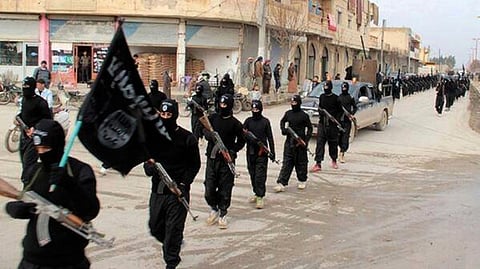Daesh is doomed to fail
In order to defeat Daesh, we need to look into allowing the Kurdish element in the battlefield, but this raises challenges

Something sinister is happening all around, which no one seems to be able to control or undermine, though almost everyone roughly knows what’s going on. World leaders gathered and dispersed recently in Antalya at the G20 summit with no clear vision of how to defeat Daesh (the self-proclaimed Islamic State of Iraq and the Levant). Apart from a few statements showing an apparent resolve to do just that, following the atrocious attacks in Paris, no one can claim that these leaders have managed to develop something that could even resemble a convincing plan to defeat Daesh.
It is hard to believe that a gang such as Daesh has been allowed to survive for more than a year with its destructive will to blindly continue killing and maiming on the basis of religious extremism, despite its many and colossal enemies possessing sufficient means to uproot it and eliminate it. Unfortunately, one is not expecting much, as these same leaders went to Antalya, dined with their host, Turkey’s President Recep Tayyip Erdogan — the man responsible for contributing, one way or another, to Daesh’s criminal act in Paris and many other atrocities in a number of cities across the Middle East.
Can Daesh be eliminated? Of course it can, provided the good will is there. How could Daesh be eliminated? First of all, you need to look into allowing the Kurdish element in the battlefield. But sadly, this is not possible under the circumstances when Turkey is engaged in a ‘survival’ war, as Erdogan calls it, with the kurds on three fronts. Two of these are vicious wars against the forces of the Democratic Union Party (YPG) in Syria and Kurdistan Workers’ party (PKK) guerrillas largely in Iraq and Turkey. Both organisations have achieved vital results in fighting and making a difference to almost every aspect of Daesh’s ideology. Therefore, it is outrageously unacceptable to see a Nato member freely pursue a policy that largely contradicts that of the international organisation.
The third ‘war’ front is rather political and where Turkey’s domestic Kurds are continuously under tremendous pressure by Erdogan’s party and state apparatuses. The Peoples Democratic Kurdish party’s (HDP) success at the polls in June this year denied Erdogan his parliamentary majority. The success of HDP, originally listed as a nationalist political party speaking on behalf of the Turkish democratic left, was seen as a real threat to his authority and he reacted by calling for a new election and simultaneously declared war against Daesh, following a number of fatal bomb attacks in the cities of Diyarbakir, Suruc and Ankara. All these attacks attributed to Daesh seem to have mysteriously targeted civilian activities associated with HDP. As a result, HDP withheld all its political activities during the election campaign, which led to a reduction in their percentage of the collective vote.
Tolerance vs reaction
This is not a war between the West and Daesh as some western writers and politicians wrongly tend to claim. This is a battle between tolerance, democracy and multicultural societies on the one hand and rejection of all forms of reaction on the other, the world over. This is clearly demonstrative by the two-way movement of human traffic: The massive Syrian refugee movement from East to West and the thousands of young men and women heading in the opposite direction from West to East — to Syria.
The only other movement similar to Daesh is the Taliban, which miserably failed to present the people of Afghanistan and some scattered areas in Pakistan with a working model of justice to gain their trust and support. This is exactly what happened almost immediately in the months after Mosul had fallen into Daesh’s hands. Leaders of both of these extreme religious organisations were ill-educated and had no knowledge of the place they were attempting to govern, particularly in Syria. After all, the first criteria needed to run Raqqa in Syria and Sinjar in Iraq has always been, since the creation of a Daesh authority in these cities, measured by their loyalty to their organisation.
As the Taliban tried to do in Afghanistan, many remember how Daesh tried not to repeat Taliban’s mistakes when it began taking new territory in Syria. The new invaders of Syrian and Iraqi cities promised local traders they would run their businesses in safe and secure conditions. But this turned out not to be the case as its leaders lacked the ability and the know-how to govern and run simple local businesses. When the town of Sinjar was recaptured recently by Kurdish forces, there was not a soul living there, as Daesh had either killed or terrified the town’s residents. Daesh was running a ghost town. This is repeated in a number of other towns and villages in areas under the control of Daesh in both Syria and Iraq.
Therefore, this reality will most certainly shorten the already short life of Daesh as it is fast running out of options. It is failing. Daesh’s main idea — if you don’t agree with us you get eliminated — is totally rejected by all, except for a few twisted minds.
Mustapha Karkouti is a former president of the Foreign Press Association, London.



